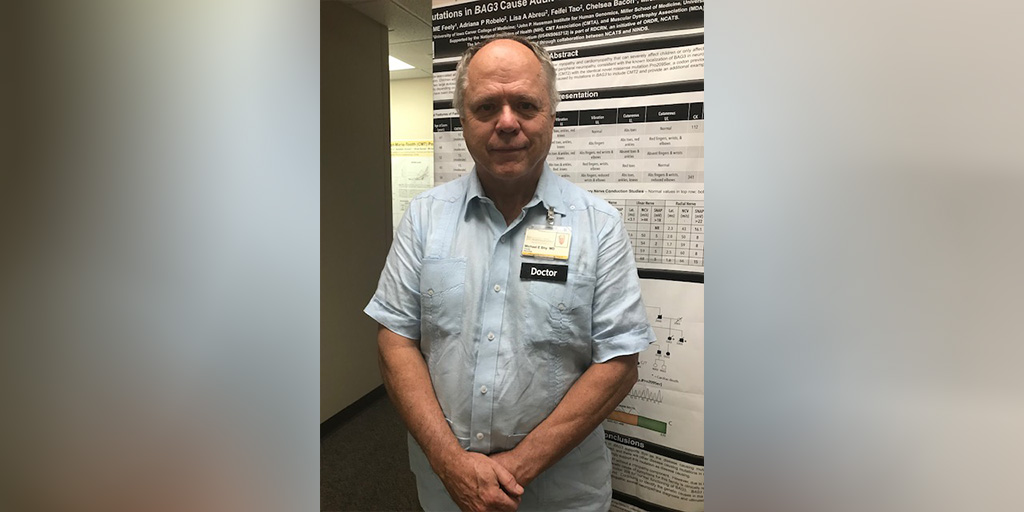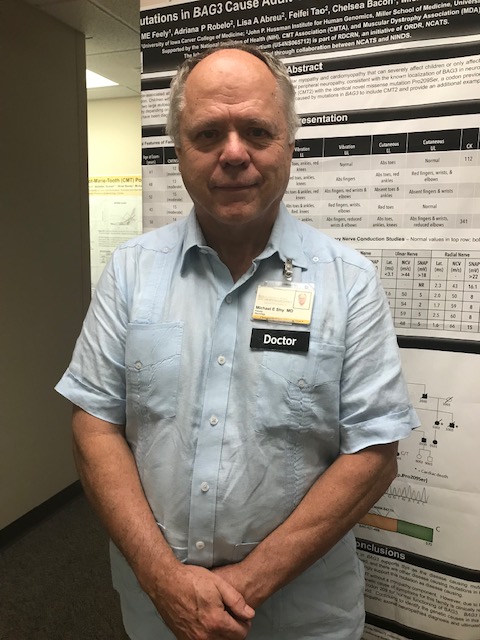
MDA Awards Clinical Research Network Grant to CMT Researcher Michael Shy for Inherited Neuropathies Consortium
By Jeanene Swanson | Friday, September 27, 2019
Michael Shy, PhD, professor of Neurology and Pediatrics at the University of Iowa, was awarded an MDA Clinical Research Network Grant (CRNG) totaling $423,413 over three years to further develop the Inherited Neuropathies Consortium (INC), a network of clinical investigators dedicated to developing the infrastructure necessary to evaluate therapies for patients with inherited peripheral neuropathies, collectively known as Charcot-Marie-Tooth disease (CMT).

Dr. Michael Shy
Dr. Shy has a long history of MDA funding. The most relevant awards include funding totaling $385,187 over three years to extend the CMT North American Database to create the North American CMT Network, the aim of which was to provide research infrastructure. Another award of $438,911 over two years allowed Dr. Shy to establish the North American CMT Consortium. His last grant of $478,799 was awarded over three years for the Inherited Neuropathies Consortium (INC), an international collection of centers devoted to developing treatments for and treating patients with CMT.
With this most recent funding, Dr. Shy will expand the INC’s natural history data to become “clinical-trial-ready” for common and rare forms of CMT; identify, characterize, and facilitate treatments for novel forms of CMT; train future investigators in the field; and share INC data with scientists, physicians, and patients in an easily accessible manner.
In CMT peripheral nerves degenerate, typically resulting in muscle weakness and sensory loss in the hands, arms, feet, and legs. The disease is progressive; however, the severity of symptoms and rate of progression depend on the type of CMT. There are many subtypes of CMT, each caused by different genetic mutations. Currently, scientists have identified more than 90 genes that cause CMT.
What is the Inherited Neuropathy Consortium?
The INC is an integrated group of academic medical centers, patient support organizations, and clinical research resources dedicated to conducting clinical research in different forms of CMT and improving the care of patients. MDA supported the early development of the INC, which was established a decade ago. The consortium is now funded primarily by the National Institutes of Health as part of the Rare Disease Clinical Research Network, though MDA still provides support. More than 10,000 patients are participating in numerous INC investigations into how CMT progresses and how genetic changes affect the disease’s severity.
The primary aim of INC is to establish a large longitudinal cohort of patients with CMT, whose data will be used to study disease progression, look for genetic modifiers to CMT1A (the most common form of CMT), and look for new genetic causes for axonal forms of CMT. In addition to searching for novel causative genes — Dr. Shy says that in the past five years, 25 new genes have been discovered by INC researchers — consortium scientists will develop and test outcome measures to determine the natural history of patients with CMT as well as train the next generation of CMT researchers, “paving the way for clinical-trial-readiness in CMT,” Dr. Shy says.
At the heart of Dr. Shy’s research are patients.
“I believe that people with a genetic disease like CMT are the best models of their disease,” he says. “Therefore, it is necessary to evaluate patients as carefully as possible so that we understand the true natural history of the different types of CMT in order to determine whether treatments are effective.” These measures include both clinical outcome measures as well as biomarkers from blood or skin biopsies.
Dr. Shy believes clinical outcome assessments, biomarker data, and natural history studies are essential to run and interpret clinical trials in CMT — and he is hopeful for the future.
“Rational clinical trials in CMT with outcome measures that can measure effectiveness are in place and will hopefully lead to effective treatments within the next three to five years for many subtypes,” he says.
About Clinical Research Network Grants
Through awarding CRNGs, MDA aims to promote and accelerate clinical-trial-readiness. These strategic awards allow a distributed network of clinical trials sites to enhance communications, coordinate activities, and standardize procedures in order to collect comprehensive natural history data and develop the outcome measures and infrastructure to facilitate clinical trials. To learn more about the Inherited Neuropathies Consortium, visit its website.
Disclaimer: No content on this site should ever be used as a substitute for direct medical advice from your doctor or other qualified clinician.




